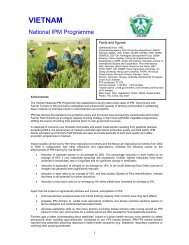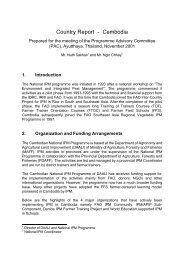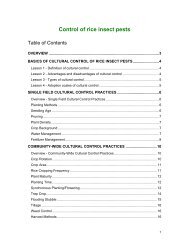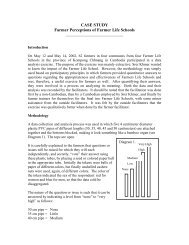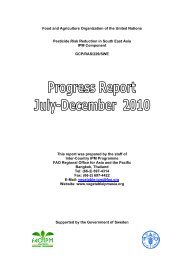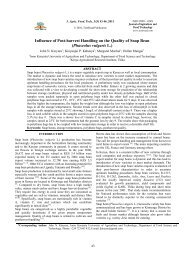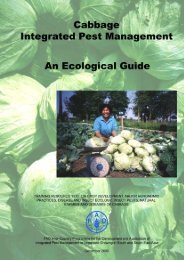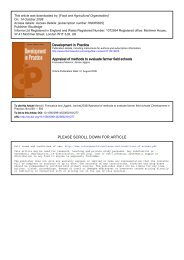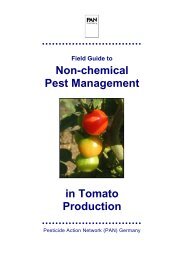Eggplant Integrated Pest Management AN ECOLOGICAL GUIDE
Eggplant Integrated Pest Management AN ECOLOGICAL GUIDE
Eggplant Integrated Pest Management AN ECOLOGICAL GUIDE
Create successful ePaper yourself
Turn your PDF publications into a flip-book with our unique Google optimized e-Paper software.
_______________________________________________________________________________________________Introduction1 INTRODUCTION1.1 <strong>Integrated</strong> <strong>Pest</strong> <strong>Management</strong>: beyond bugs…<strong>Integrated</strong> pest management, IPM, is still strongly associated withpests. However, it is much more than just pest control. IPM is notabout eliminating all pests; in fact, low level populations of somepests are needed to keep natural enemies in the field. The aim ofIPM is to reduce pest populations to avoid damage levels that causeyield loss. The entry point of an IPM programme may often befocused on reduction of pesticide use. However, the basis of goodcrop management decisions is a better understanding of the cropecosystem, including that of the pests, their natural enemies, and the surrounding environment.Monitoring of the crop is the first step in understanding ecosystems, making sound decisions about allaspects of growing a healthy crop, taking IPM beyond bugs and plant protection.Experiences over several years with vegetable IPM show that good crop management practices maylead to reduction of inputs (including pesticides), without reduction in yield. In fact, yields often increasein IPM fields.IPM strategies are different for each crop, for a country, for a region, even for one location, depending onlocal varieties used and local agronomic practices. IPM can never be delivered in a “package”, it needsto be developed, adapted, tailor-made to fit local requirements. Yet, experiences from one area, or fromother countries may be helpful to set up field studies for testing the components that may lead totolerable pest populations and a high yield of good quality produce. Some of these experiences andpractices are summarized in this guide.1.2 The vegetable IPM ProgrammeThe FAO Inter-Country Programme to strengthen IPM training and sustain IPM practices amongVegetable farmers in South and Southeast Asia (Phase II) is a five-year regional program (July 2002 –June 2007). This programme builds on the success of Phase I of the Inter-Country Programme (ICP) forVegetable IPM which, since April 1996, has carried out applied research, extension and farmer educationactivities to promote and support <strong>Integrated</strong> <strong>Pest</strong> <strong>Management</strong> in vegetables by Asian smallholderfarmers. During Phase I, the ICP focused on enhancing the Governments' and NGOs' capability toimplement training programmes in seven countries using the "Training of Trainers" (TOT) and "FarmerField School" (FFS) approach. More than 600 trainers and 30,000 farmers have been trained since thebeginning of Phase I.Phase II of the ICP, funded by the Netherlands and Australia, operates through governments and NGOsin Bangladesh, Cambodia, China, the Lao PDR, Indonesia, the Philippines, Thailand and Vietnam. ThePhase II of the ICP will emphasize vegetable IPM farmer participatory training and research in fivecountries in the Greater Mekong Subregion, with a sharper focus on major crops and pests. Specificallythe Programme will:1. Strengthen and expand the capability of government agencies and NGOs to carry out IPM trainingand continuing field activities;2. Create and strengthen groups of smallholder farmers so that they can take collective action insupport of ecologically-based vegetable production and marketing; and,3. Institute sustainable arrangements for the solution of technical problems.Phase II will be more sensitive to quality control and participatory training and research activities, gender,impact assessment and regional exchanges of experiences on issues related to vegetable IPM programwork. The project will provide advice, organize training, arrange exchanges of expertise, and fund fieldstudies and follow-up activities in the field.These activities will be carried out in close collaboration with other regional, national and local IPMrelatedprojects funded by governments, donor agencies and NGOs.2<strong>Eggplant</strong> Ecological Guide



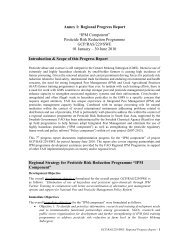
![Section 4 [ PDF file, 252 KB] - The Field Alliance](https://img.yumpu.com/51387260/1/158x260/section-4-pdf-file-252-kb-the-field-alliance.jpg?quality=85)
